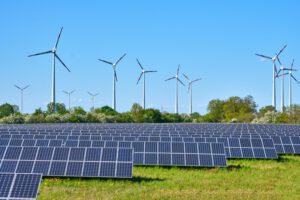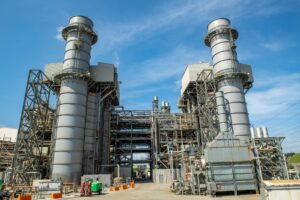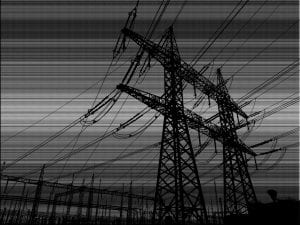IIJA
-
Hydrogen
California, Pacific Northwest Hydrogen Hubs Secure First Tranche of $7B Federal Awards
The California Hydrogen Hub and the Pacific Northwest Hydrogen Hub have garnered a combined $57.5 million in the first tranche of funding under the Department of Energy’s (DOE’s) $7 billion Regional Clean Hydrogen Hubs (H2Hubs) program. H2Hubs, managed by DOE’s Office of Clean Energy Demonstrations (OCED), is backed by funding from the Infrastructure Investment and […]
-
Renewables
Deloitte Report Highlights Growth in Renewables, Challenges for 2024
Investments in renewable energy resources across the U.S. continue to grow, supported by increased federal funding, legislation that improves project economics, and growing demand for cleaner energy. Deloitte, which provides insights and solutions for several industries including the energy sector, on Dec. 5 released its industry outlook for 2024 for renewable energy in the U.S., […]
-
Trends
U.S. Deploys $3.5B Boost for Grid Resilience: Major Projects Revealed
Fifty-eight projects spearheaded by major U.S. power stakeholders will receive up to $3.5 billion in federal funding to improve grid flexibility and boost power system resiliency against extreme weather and climate change, the Biden administration announced on Oct. 18. The projects mark the Department of Energy’s (DOE’s) first competitive selections under the Grid Resilience and […]
-
Hydrogen
U.S. Unveils Seven Regional Hydrogen Hubs, Awards $7B to Kickstart National Hydrogen Network
Seven regional hydrogen hubs spanning Appalachia, California, the Midwest, the Gulf Coast, the American heartland, the Mid-Atlantic, and the Pacific Northwest are poised to receive $7 billion in Infrastructure Investment and Jobs Act (IIJA) funding under the Department of Energy’s (DOE’s) Regional Clean Hydrogen Hubs Program (H2Hubs). The selections, unveiled by the Biden administration on […]
-
Electrification
U.S. Power Sector Trade Groups Flag Critical Electrical Steel Crunch
Nine trade groups—including four representing the power sector—have urged the Biden administration to prioritize actions that support the domestic production of electrical steel, warning that shortages are contributing to “significant and persistent” supply chain challenges. The groups, which include the Edison Electric Institute (EEI), the American Public Power Association (APPA), the National Rural Electric Cooperative […]
-
Hydrogen
Six Major Electric Utilities Join Forces to Pursue a Southeastern Hydrogen Hub
Marking intent interest from the power sector in hydrogen’s decarbonization potential, six major utilities—Dominion Energy, Duke Energy, Louisville Gas & Electric Co. (LG&E), Kentucky Utilities Co. (KU), Southern Co., and the Tennessee Valley Authority (TVA)—have announced they will jointly pursue federal financial support for a Southeast Hydrogen Hub. The utilities, along with Battelle, an independent […]
-
Nuclear
U.S. Utility Survey Suggests Industry Mulling Additions of 90 GW of New Nuclear
A Nuclear Energy Institute (NEI) survey suggests U.S. utility members expect to add up to 90 GW of new nuclear generation by the 2050s, including more than 300 new small modular reactors (SMRs) in the U.S. over the next 25 years. The nuclear industry group’s survey, unveiled on July 29, sought to gather input from […]
-
T&D
DOE Launches $2.5B Fund to Upgrade and Build New Transmission Lines
The Biden administration has launched efforts to shape the $2.5 billion Transmission Facilitation Program (TFP), a key Infrastructure Investment and Jobs Act (IIJA) initiative dedicated to building out critical new transmission lines and related facilities across the country. The Department of Energy’s Grid Deployment Office on May 10 issued a joint notice of information (NOI) […]
-
Commentary
Competition for Cleaner Energy Will Pay Dividends for Climate and the Economy
America’s energy system has entered a new era where companies are competing against one another to reduce greenhouse gas emissions. Customers—large and small—are concerned about climate change, forcing business models to adapt beyond keeping the lights on. Today, 75% of households in the U.S. are served by a utility with a carbon or emissions reduction goal—to […]









